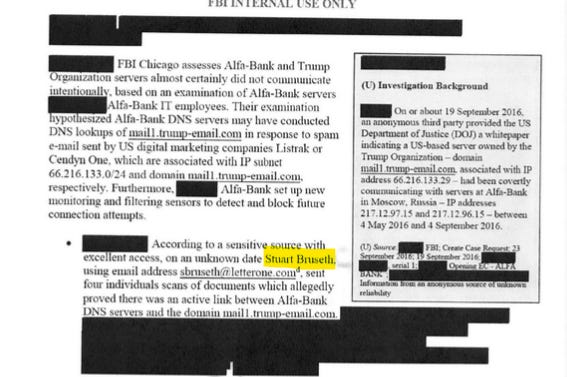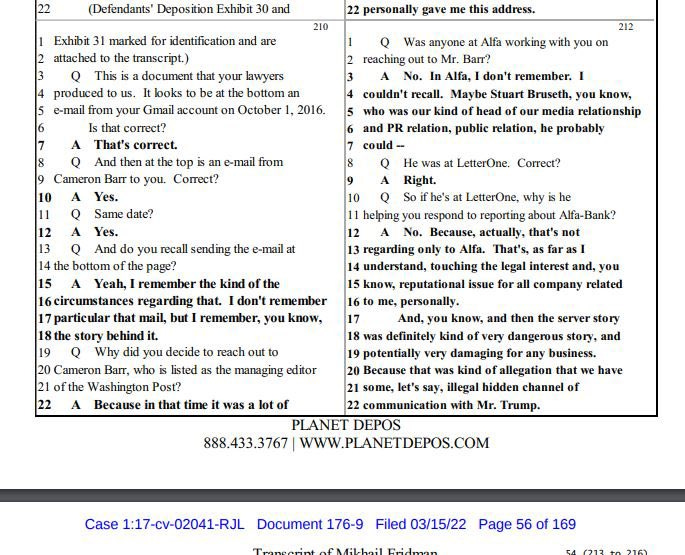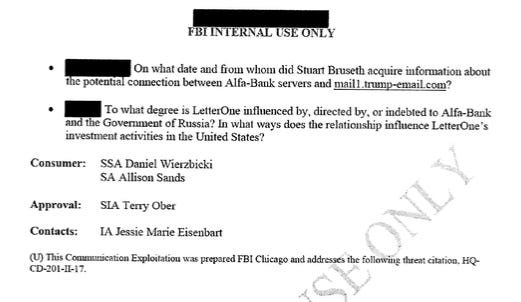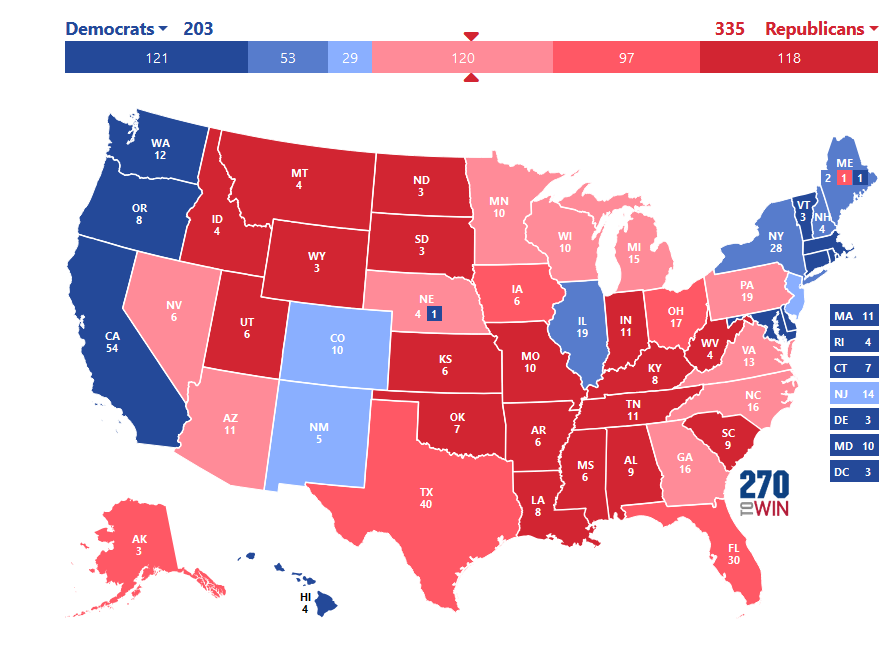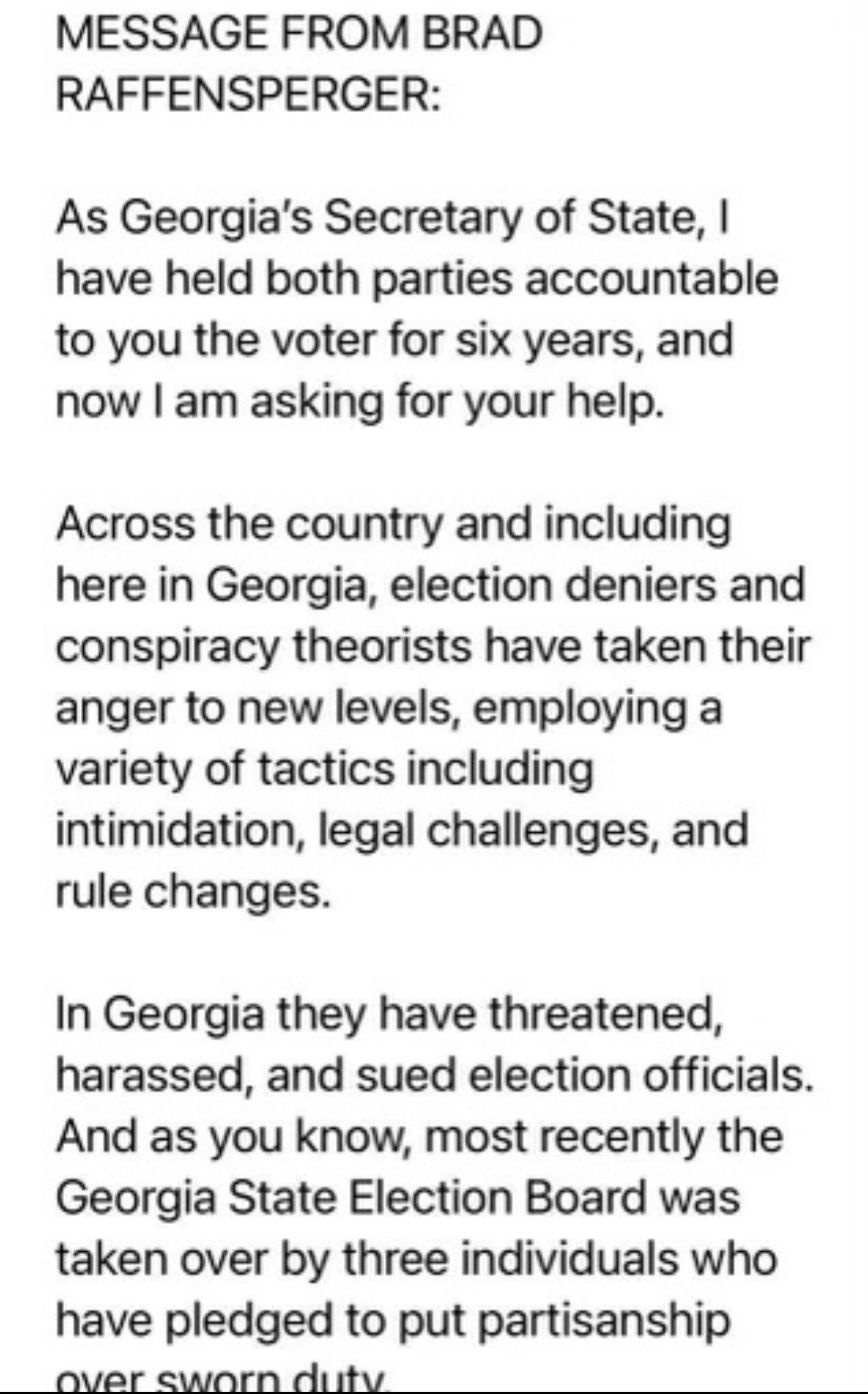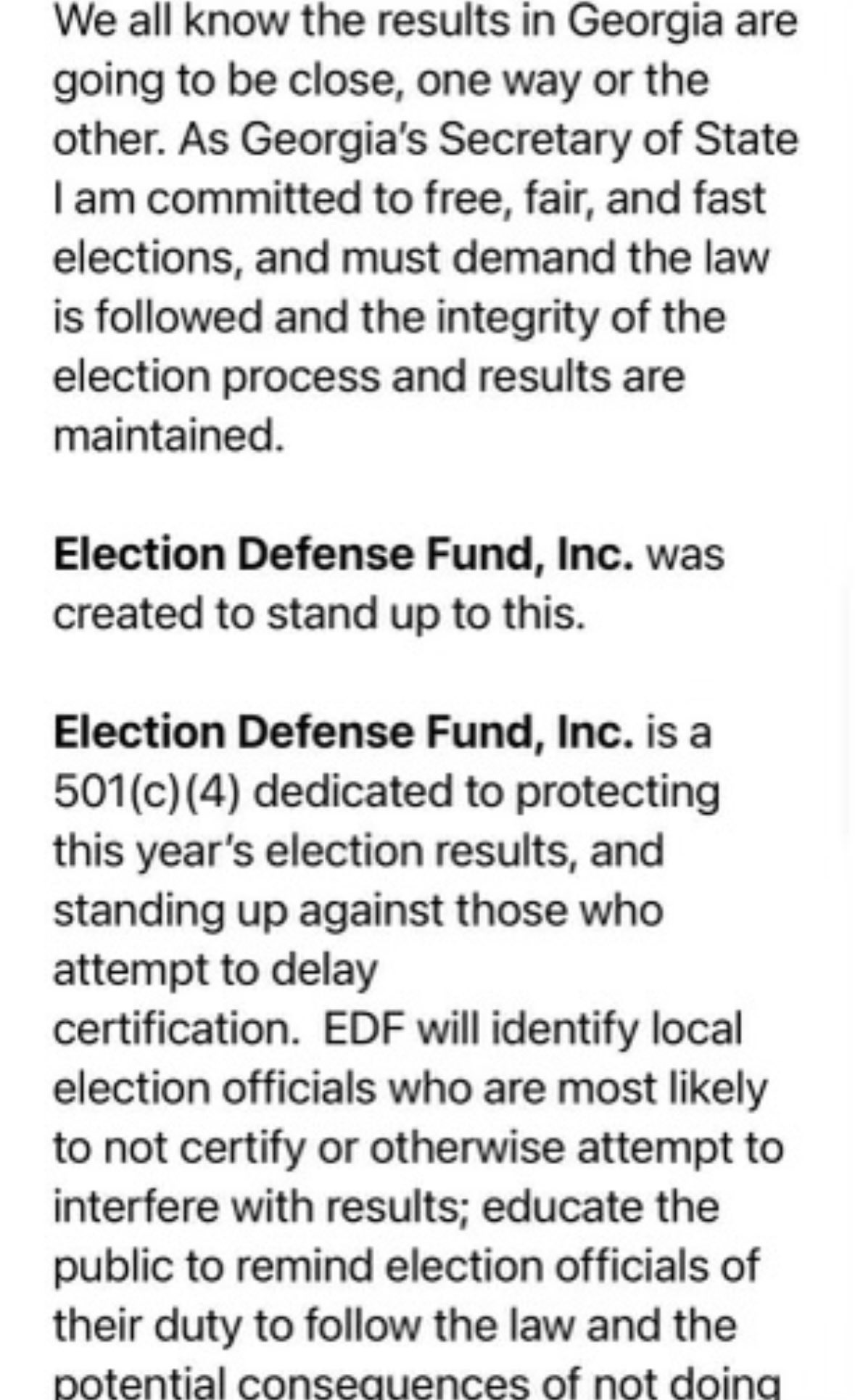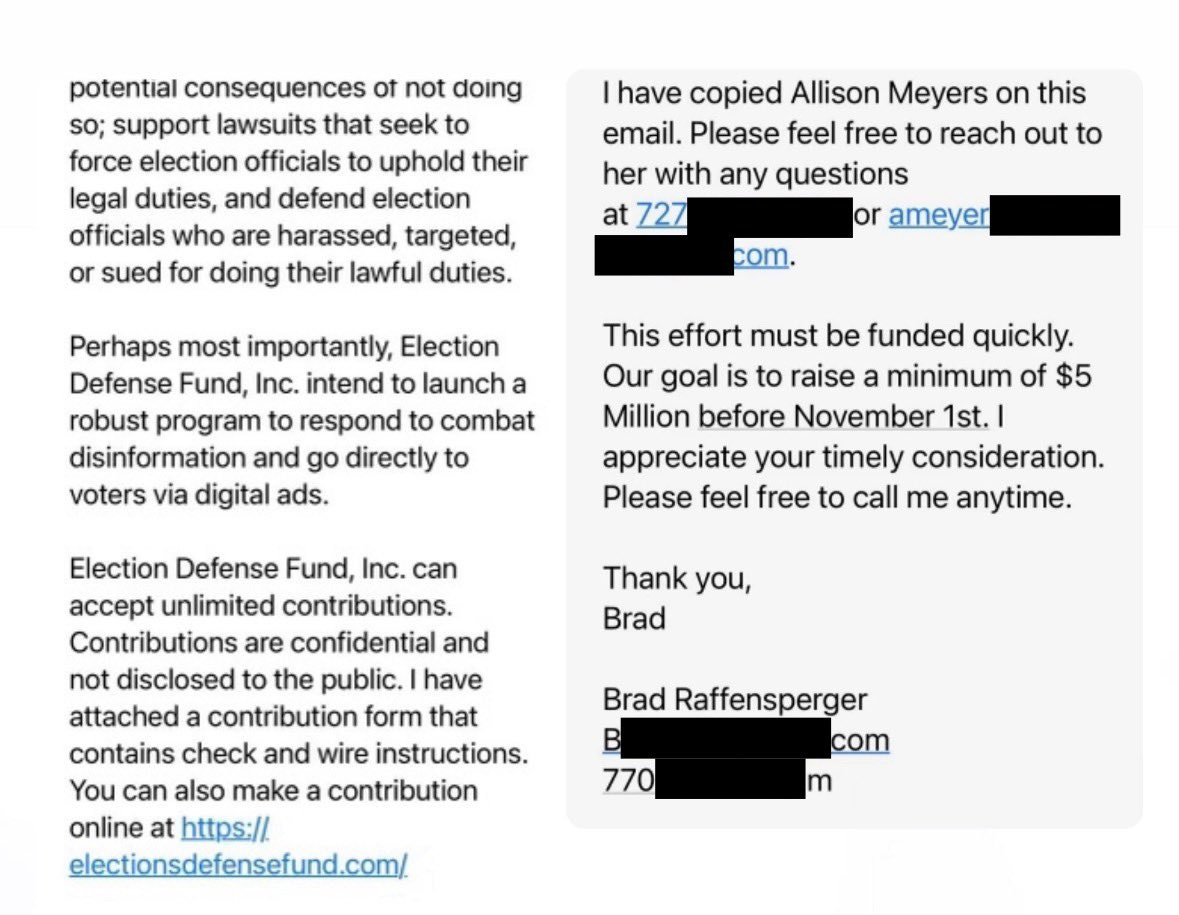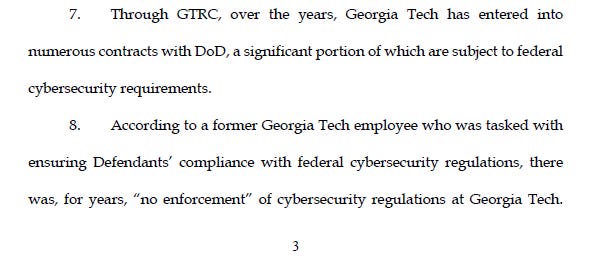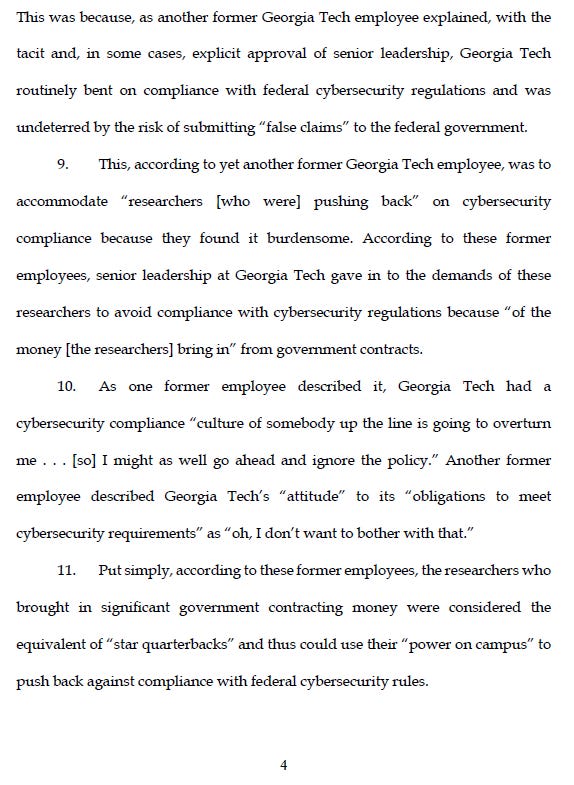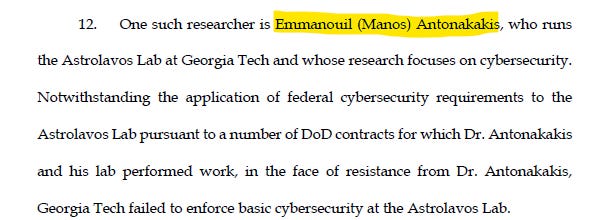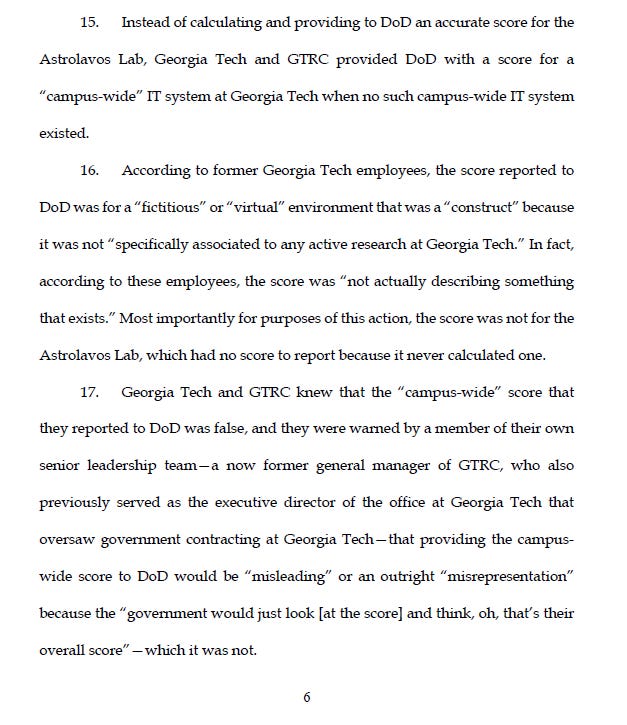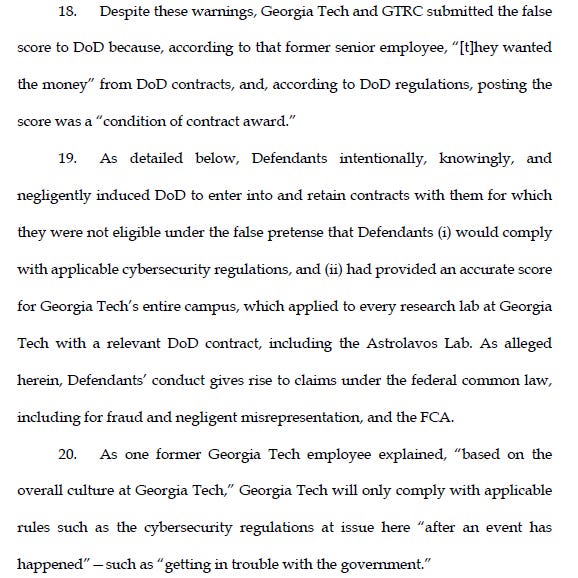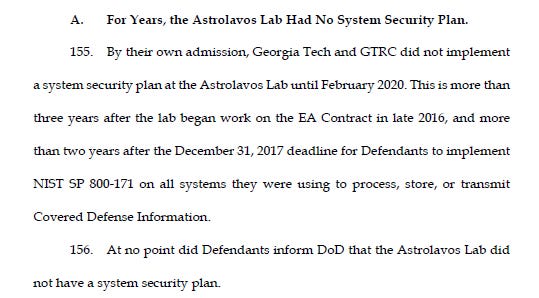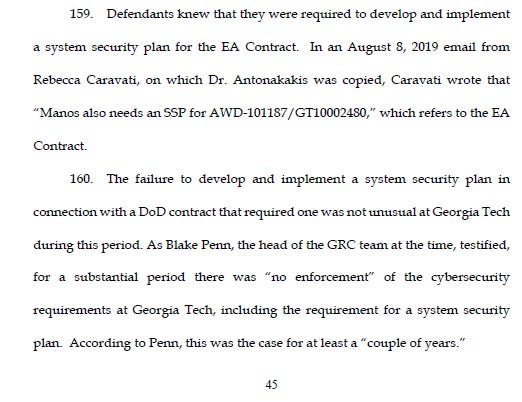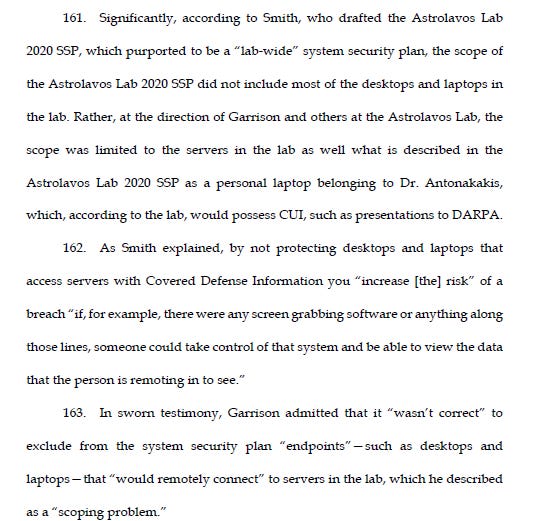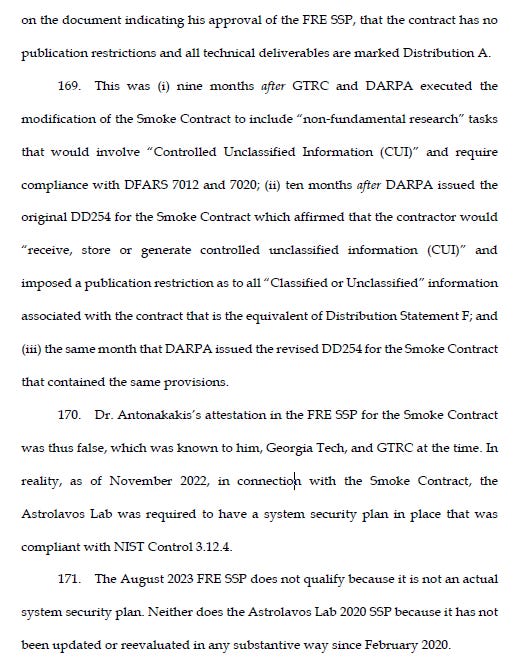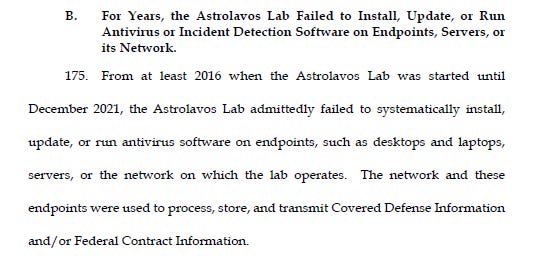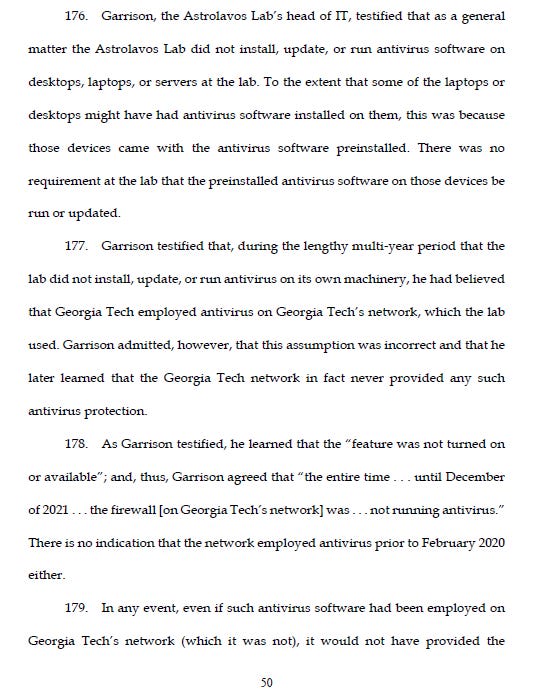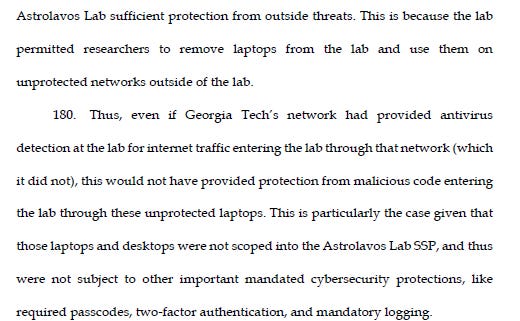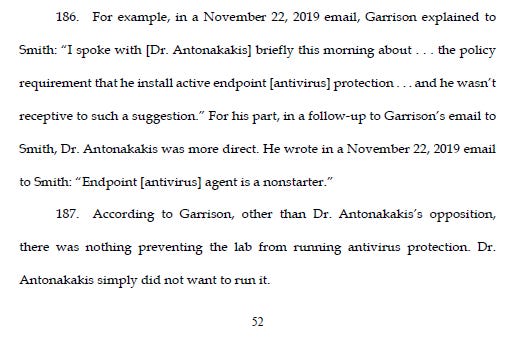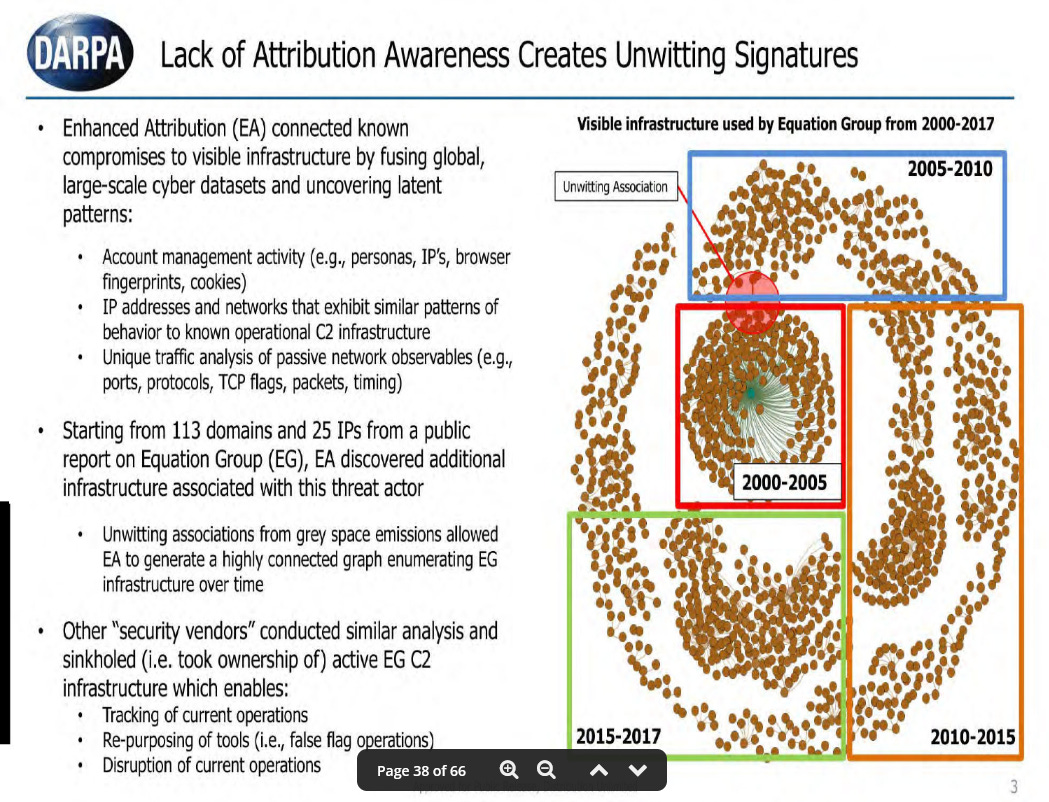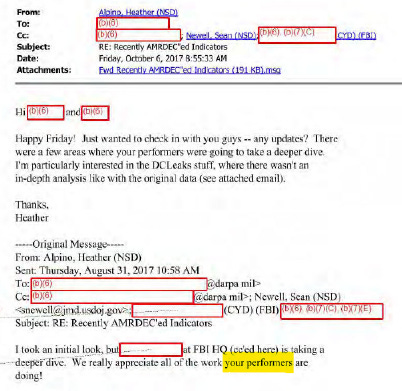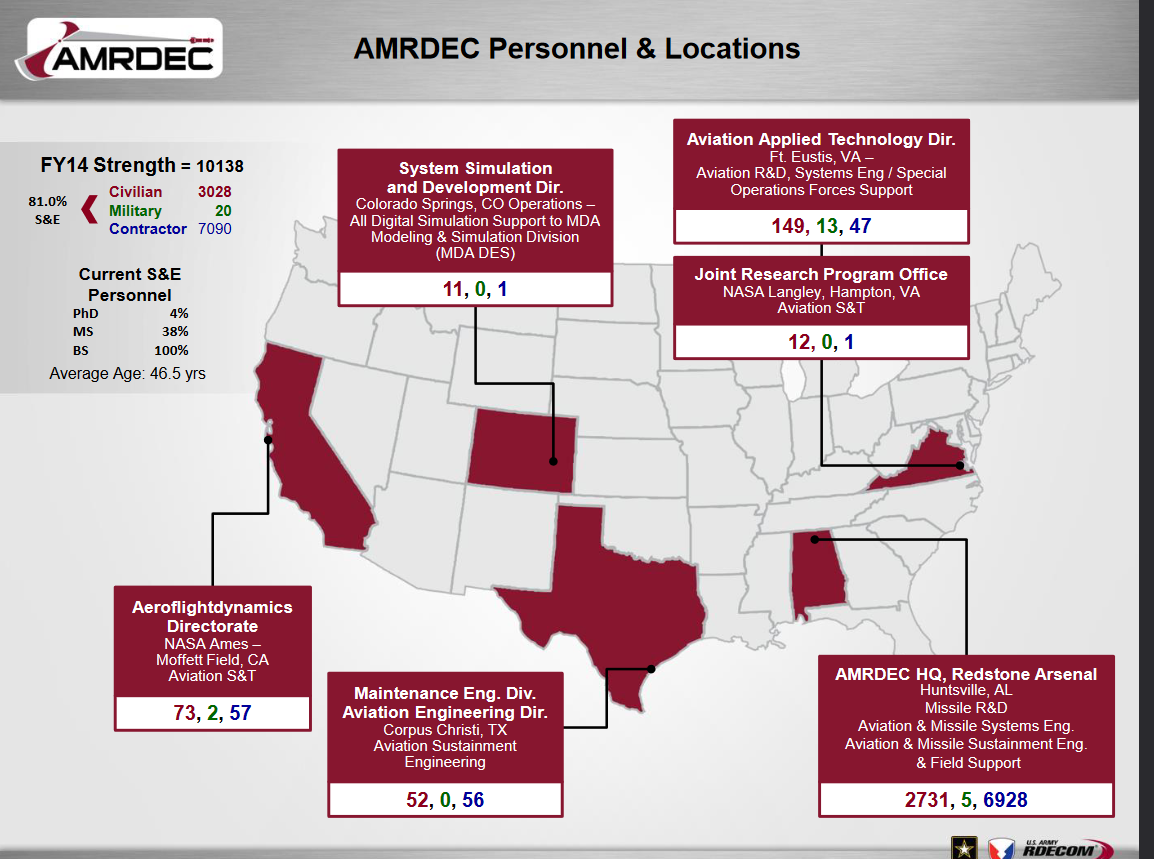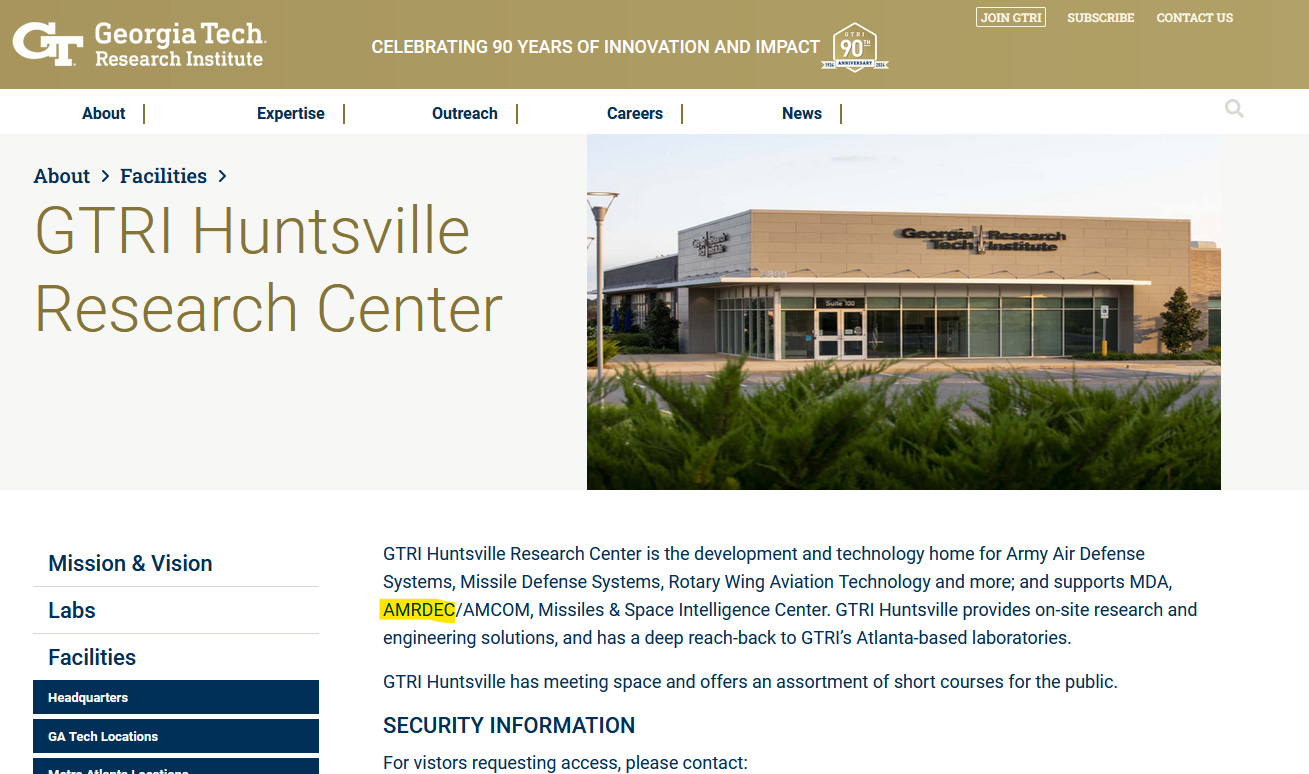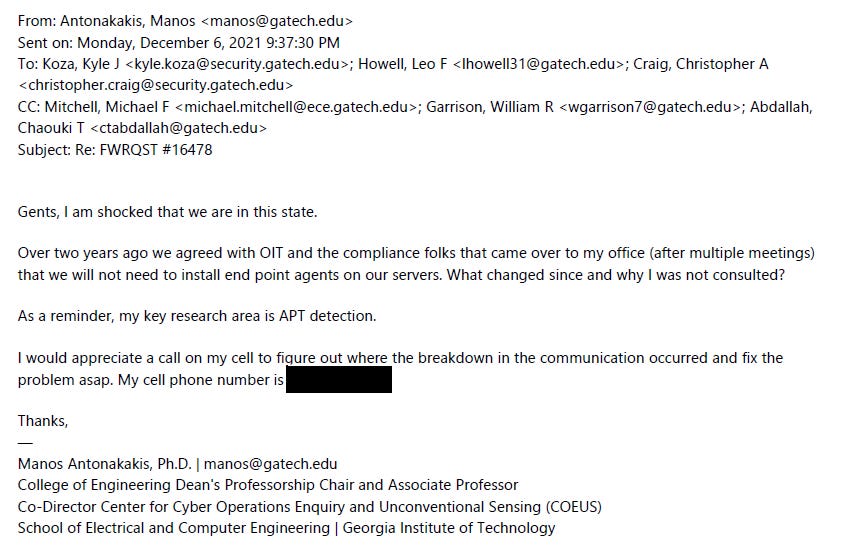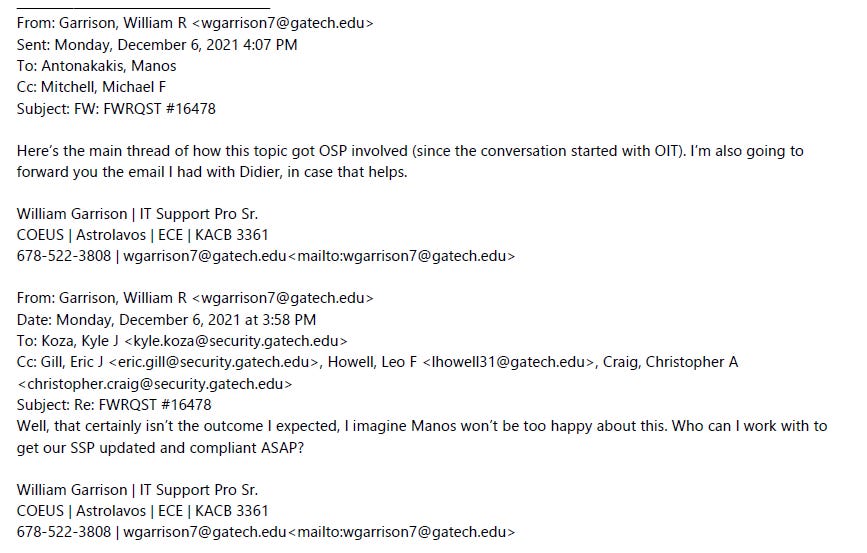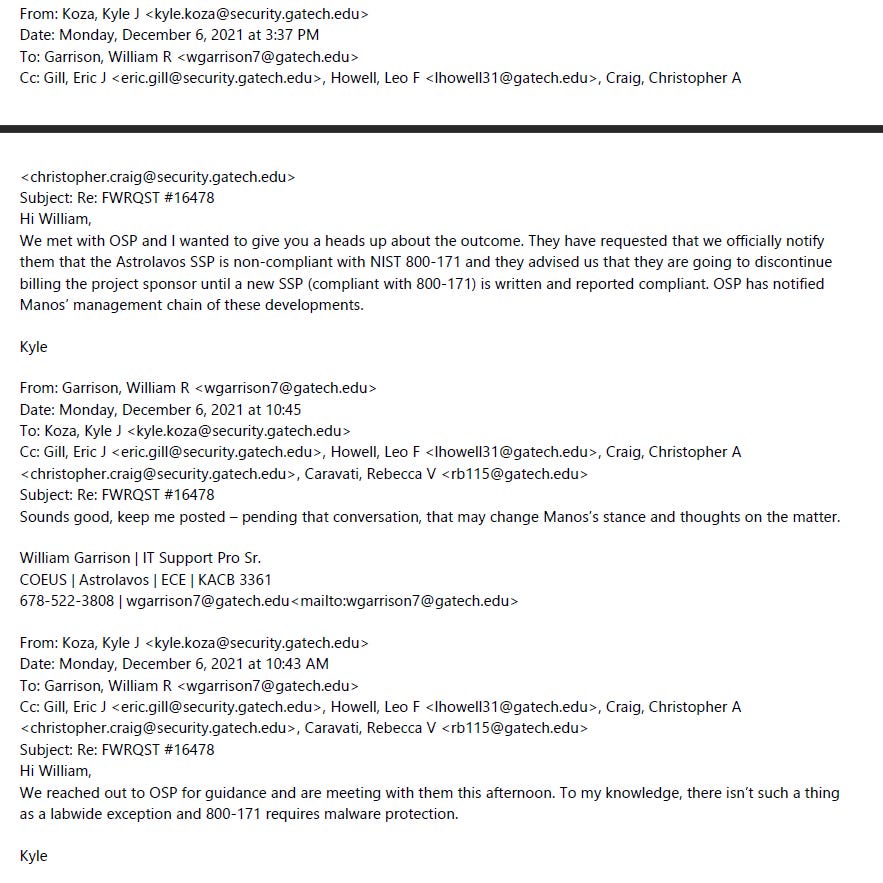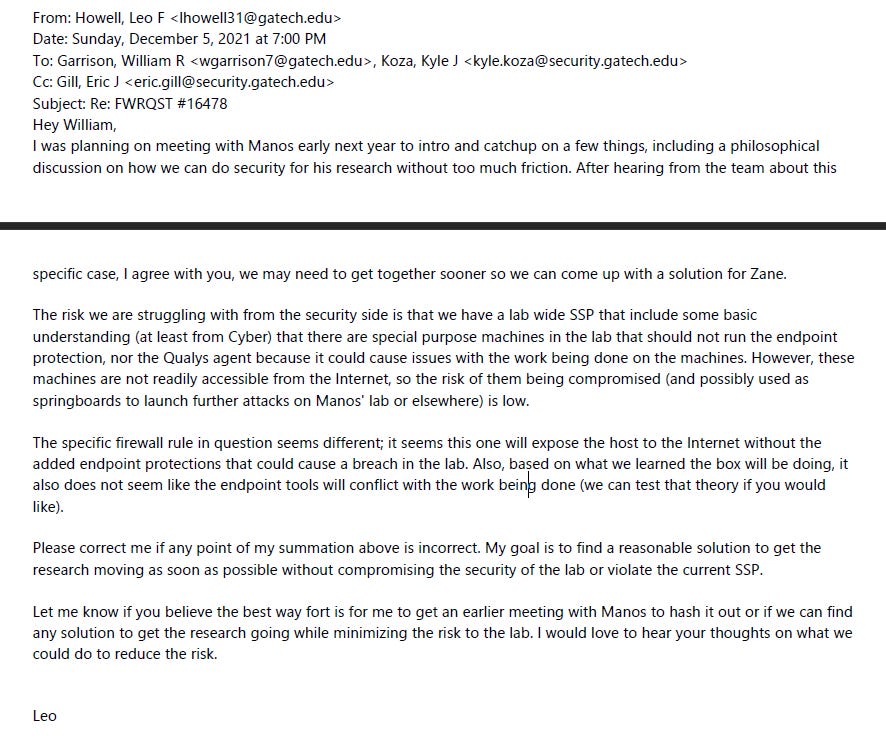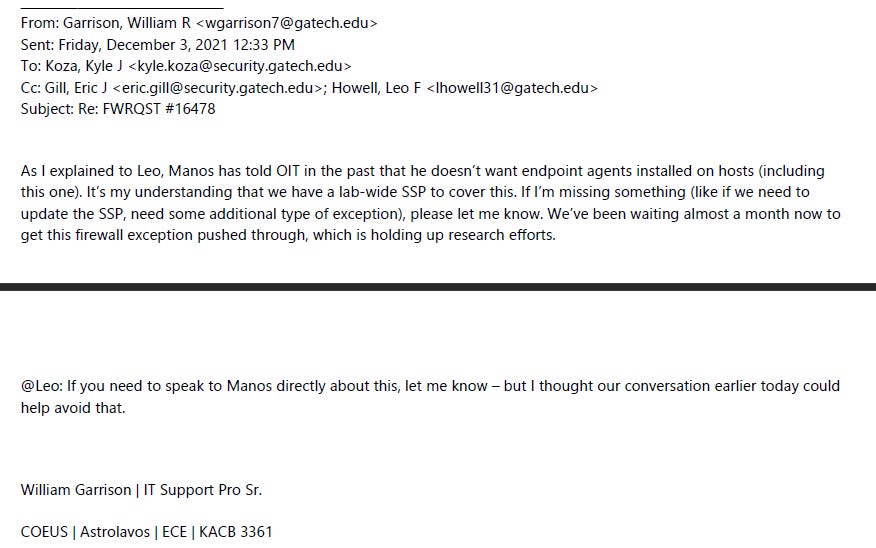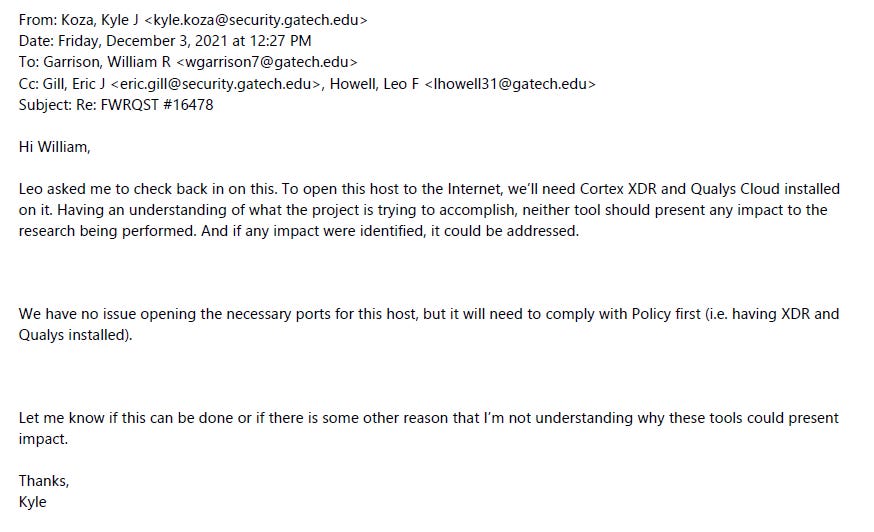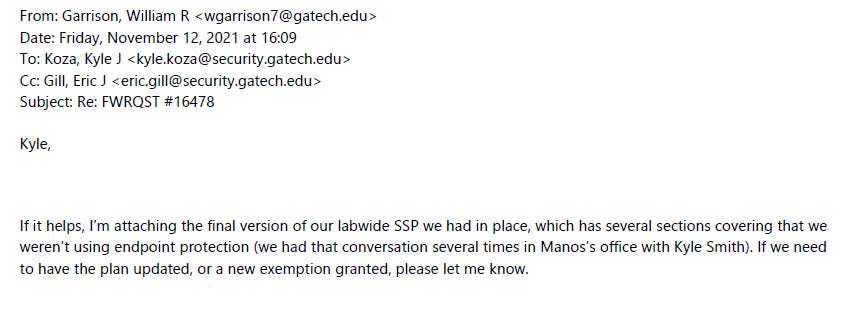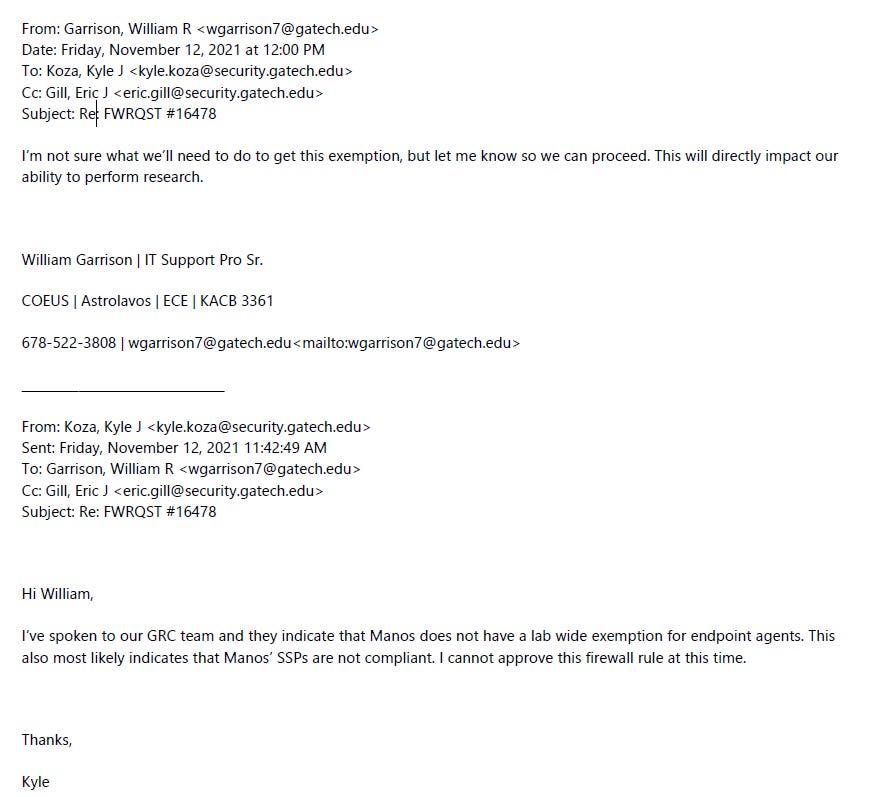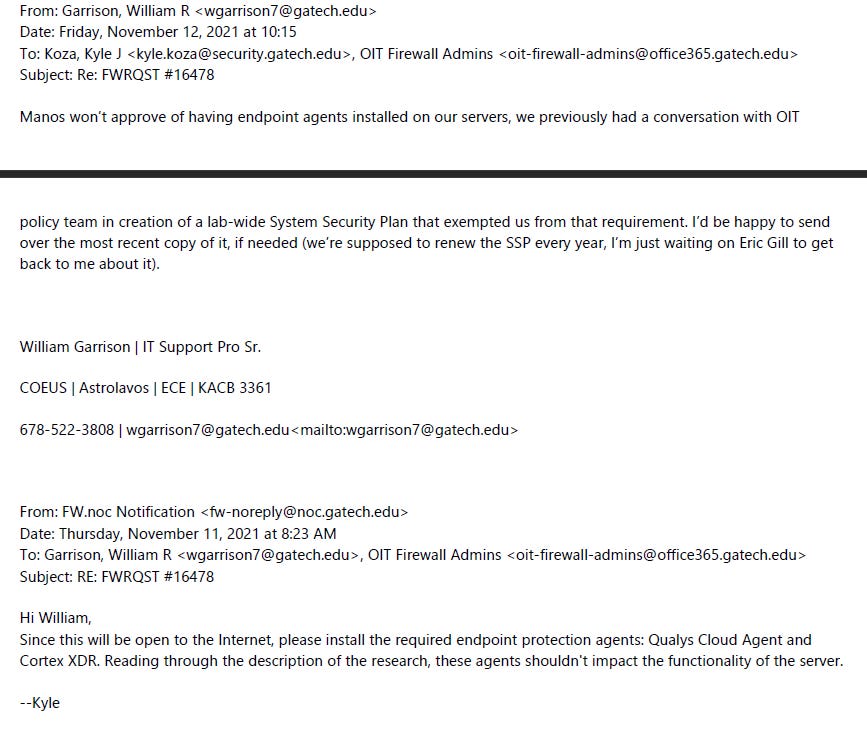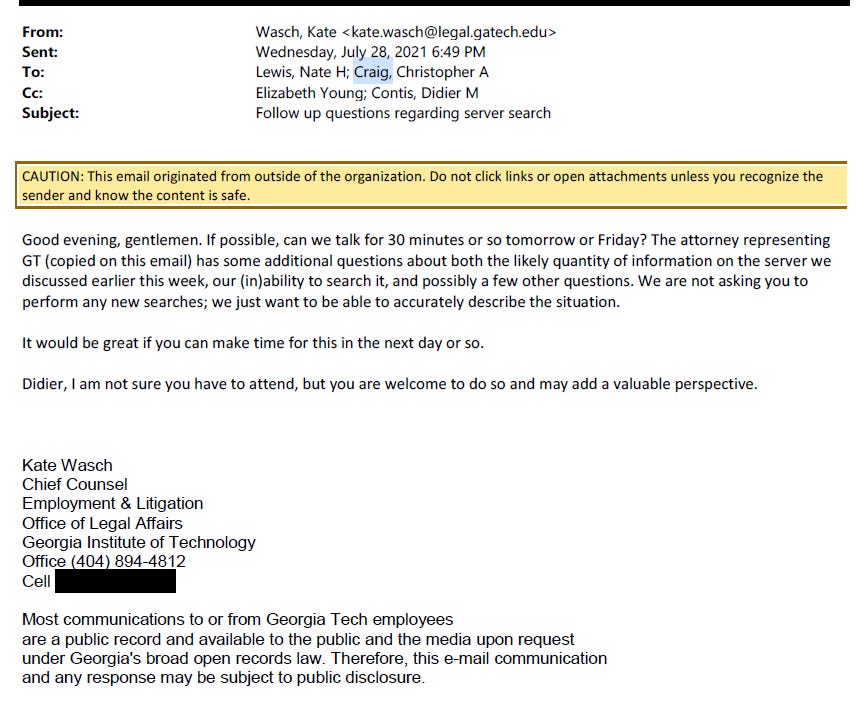They left plenty unredacted, enough for a story and to start breaking this open.
This isn’t from our Georgia case, which is still waiting on a remand from the Appeals court. This is from one of my pro se lawsuits against the government. If you recall, we received two “productions” of this document earlier this year that were 100% redacted.
I’m still going to fight the remaining redactions but today’s production had what we needed.
In the next few days, be on the lookout for a story and the document.
I also want to say thank you to Margot Cleveland for helping me with FOIA’ing Georgia Tech throughout much of 2022, to Jerry Dunleavy for getting DARPA on the record, and Senators Grassley and Johnson for making inquiries of DARPA that resulted in the response that I needed to identify this document.
It’s gametime.
]]>By October 3rd, the FBI had destroyed the white paper, finding technical inconsistencies to such an extent that FBI agents mocked the analysis as “absurd” and “worthless” in messages between each other.
Their report also contained something quite intriguing:
The FBI obtained information from a “sensitive” source who knew that Stuart Bruseth had emailed 4 individuals with the Trump server allegations. Who could this source be? How did the FBI get this just 2 weeks after the allegations were delivered? How could the source not know the date of the emails but know that 4 people were emailed?
I’ve heard….rumors…of an anonymous “letter” being sent to David Dagon. It’s too soon and too much of a leap to make the connection to Bruseth (particularly because letters are not synonymous with emails, and Bruseth didn’t sent the emails anonymously), but there appears to be an untold chapter or two to the Alfa Bank story.
Which piece is the chicken and which is the egg, and which of our known characters have connections to Bruseth?
Bruseth was the Director of Communications for Letterone. That’s very interesting because the same Russian oligarchs founded and owned both Alfa Bank and Letterone. In fact, they would ask Bruseth to communicate with journalists running stories in the wake of the allegations and throughout the ensuing litigation:
Hat tip to Walkafyre for having this page of the Mikhail Fridman transcript saved.
Bruseth continued to work for Letterone until October 2021, shortly after the indictment of Michael Sussmann. Presumably, he departed out of fears that his own involvement would be disclosed.
Who are the 4 individuals he emails his claims to? Who is this mysterious source who connected the dots for the FBI early into the investigation?
The FBI ended their report with some tantalizing questions:
]]>There are two avenues at this point. First, they could order a mass declassification of documents. There is what is colloquially known as the “binder of documents” from 4 years ago and there are likely some very interesting documents.
The second avenue is to use subpoena power to go get answers. This is subject to the appetites of members of Congress or the Trump DOJ and quite honestly, I don’t see them doing it. The Republicans had the House 2 years ago and did nothing.
But maybe the appetite will build as documents are declassified and released. So let’s do an exercise on where they should start.
From a documents standpoint, I would say:
Netyksho grand jury files - We’ve long suspected that key answers to the DNC hack and attribution have been sequestered behind grand jury secrecy. We think those documents will link back to DARPA as a cutout for the same Clinton-connected cyber researchers associated with the Alfa Bank scandal.
Crowdstrike attribution reports - FOIA fights have ended at “trade secrets” exemptions that I suspect don’t have much merit. Trump could order the release of the reports with minimal redactions.
Mueller team files - We know most of their phones were wiped, but there should still be emails, notes, and other files (even beyond what US Attorney Jeff Jensen found). All of that could be released. I think this is also where Special Counsel Durham got hung up. Special Counsels investigating each other is a recipe for madness and further politicization of our system - but in this case, Mueller’s team deserved an investigation.
DARPA emails and files - Starting with Angelos Keromytis, Christopher Schneck and Tejas Patel, there is much to learn about Russiagate but also about their role in criminal investigations for the DOJ more broadly. I would also want to see the emails for Director Tompkins and the communications team who fielded some pointed inquiries from Senators Grassley and Johnson in the last few years.
DOJ/FBI emails and files - Outside of the Mueller team and beyond the DNC hack, there are still many questions that are open. Pientka, Auten, Elvis Chan, the list is long and if confidence is to be restored, all of it should be declassified and released.
Obama files - Here is where it gets interesting, because nobody has fought for Obama administration files yet. But we had President Biden waive executive privilege for President Trump, setting an insane precedent. In theory, President Trump can waive President Obama’s executive privilege and order the release of all of his files. On July 28, 2016 Obama was briefed on the alleged Clinton plan to tie Trump to Putin. There should be a number of files and briefing materials from that day, and quite obviously other key dates. Some of those may be considered CIA/ODNI files, it gets a little convoluted. What did Obama know and when did he know it?
NSA files - The NSA has a relationship with Rodney Joffe. Whether it ties into Russiagate or not, I would like to learn much more about that relationship and corporate entities like Packet Forensics, Appmosferic, Measurement Systems, Global Resource Systems, and Trustcor, along with Victor Oppleman, Raymond Saulino and their long-time corporate attorney.
If someone were to exercise subpoena power, there are dozens of people who could be subpoenaed for testimony and documents. They would also need to decide whether to grant immunity to people like Joffe.
Jared Novick might be a good person to start with, and then I would move on to Lisa Hook, Rory Yegerman, Tim Cody, Joe Pientka, Yacin Nadji, and continue down the list.
The DOD is set to release the Antonakakis/Dagon attribution report by next Friday, which should be interesting, even if we have to fight a few more redactions.
]]>Our prediction didn’t turn out too badly, we missed on Virginia and Minnesota but did capture the large swings in deep blue states like Illinois.
You can almost set your watch to the next manufactured crisis from the “deep state”, but hopefully Trump moves 100 miles an hour from here.
There are a few policies we’d like to see in the next administration, and this is just meant to be a fun post. We will do another expanding on Russiagate specifically.
DOJ Task Force - There should be a team setup inside DOJ reviewing the Netyksho case, DNC hack attribution, public-private surveillance and data collection, and more. There are indications that some confidential human sources for the FBI are employed as journalists at major media outlets. Everything needs to be reviewed. If documents merit it, a criminal investigation should be pursued and it’s time for mass-declassification of documents.
Government Efficiency - It appears Trump is set to pursue this one already, which should result in a dramatic shrinking of the government. As one example, DHS was set up to consolidate intelligence after 9/11, but today it has 250,000 employees and dozens of departments with unclear missions. All of that should be eliminated. Agency by agency, massive cuts should be the first move. As a consequence, Virginia could conceivably be put back into play for Republicans as government employees residing in the North move to find work.
FOIA reform - FOIA processing should be consolidated and brought “in-house” across the whole of the federal government. Requesters should be able to engage an advocate who holds a security clearance to fight for disclosure of documents before an independent board.
Comprehensive data privacy legislation - They abused data sources and government contracts to mine for dirt against Donald Trump, which should have highlighted the need for new legislation. All cell phone and internet data should belong to the individual in perpetuity. It should not be bought, sold, or shared without consent and consent should not be required for a transaction. It shouldn’t even be allowed to be stored beyond 1 year. This will upset big tech, but it’s time for them to be cut out at the knees anyway.
Social Security - The antiquated social security number system needs an upgrade. A more modern system could see tokenization and public/private keys. They need to look at privatization as well.
Schools - Spending has increased every year for decades, largely because classroom sizes have decreased. Teacher unions suggest smaller class sizes leads to more one-on-one attention but that doesnt appear to be the case. It’s time for a study that keeps funding the same for a school, increases classroom sizes to 30, provides tutors to every student and lengthens the school year. Let’s see what happens.
Diplomas? - Standards have collapsed. Take a look at Baltimore schools if you need an example. There are schools without any students reading at grade level or proficient in math. If they obtain a diploma, what value does it have? We should do a study that eliminates school grades and credits for diplomas, and instead uses a comprehensive test as the only benchmark. If a student passes it at 15 years old, give them their funding to take with them to start college courses for 3 years.
Health Care - Our system has the worst characteristics of socialism and capitalism because it’s both. There is a massive delta between cost and spending, and there is no competition to bring down costs. The question is how do we make a system that enables a single doctor to prescribe medication, do blood testing and send it to a lab, and also do x-rays himself (no specialists) at a price point where insurance isn’t needed? Every problem in the answer to that question is what needs to be changed. When someone doesn’t need insurance for their standard healthcare issues, costs will go down.
Election Reform - I’m not a proponent of “voter fraud” narratives, but the current system really can’t be audited once ballots are accepted. That is a problem. There is nothing wrong with voter ID and some simple changes.
Mental Health Reform - We need a federal framework. Right now our system is a mess and quite different state-by-state. Generally speaking, you can have a mentally disturbed individual sharing that they have homicidal ideations and refuse to take their medication and at most, you might be able to involuntarily commit them for a day for an evaluation. That’s a huge problem. We need a system that protects the rights of the mentally ill but also balances the risk to the public. How do you deprive someone of their liberty who hasn’t committed a crime? We might need a constitutional amendment on this.
Two years ago Republicans took the House and I interviewed for a position on the Weaponization Committee. I made sure Jim Jordan knew everything that I had on Russiagate and they were supposed to be a modern Church Committee. Instead they did nothing.
That can’t happen again. We will use all of our power and contacts to make sure that the Trump team knows where to look.
I know enough to know there are breath-taking disclosures ahead.
]]>While we are still waiting on developments, we might as well offer an election prediction with the caveat that I have no special insight into elections or politics.
The popular vote in the last 4 elections has looked like this:
Quite obviously, 2020 was an outlier driven by COVID lockdowns.
I think that the Democrats will revert to the mean to a larger extent than the GOP. We are further removed from the Dobbs decision, Joe Biden is unpopular, and I don’t think there is much excitement for Kamala Harris. To the extent it’s become a referendum on Trump, he has enjoyed a post-Presidency improvement in his approval rating.
And what about the polls? We’ve never seen the national polls show a race this close before. Have they made improvements? Are Trump supporters less shy and more apt to respond to pollsters in 2024?
I think they are still undercutting his support, perhaps by 3-4 points.
Blue states are getting redder, and red states are getting more blue.
My prediction is:
It’s a large electoral win but I suspect the “battleground” states will very, very close.
I gave Trump Minnesota as the endorsements from the Somali community loom large in the metropolitan area. Similarly, I gave Trump Michigan where Dearborn will be decidedly less Democratic owing to events in the Middle East and significant “woke” concerns from the Muslim community, largely around pornographic books in schools and transgender issues - Trump is the only candidate that has talking about the latter.
I suspect New York and Illinois will be wins for Kamala, but the margins will be surprising, perhaps between 7-10 point wins for her (usually much larger in those states).
Virginia was the toughest call. I rolled with Trump based on national trends in voter registration (though Virginia doesnt have partisan registration, I think those trends will play there as well).
All in good fun.
Have a great election day, regardless of which candidate you support.
One last reminder, there was an Afghan national arrested for plotting terrorism on Election Day. Remember, if you see something suspicious, say something, and keep saying it until the issue is addressed.
]]>In the last couple days, a handful of screenshots have circulated concerning Georgia Secretary of State Brad Raffensperger starting a 501(c)(4) called Election Defense Fund. A quick perusing of the registration documents do not show him included.
However, the screenshots of this email invoke his name:
And they include his personal email address.
Here is the theory under Georgia’s Open Records law that I propose: Raffensperger has an important role in the election process, so it’s difficult to decouple his responsibilities as an agent of the state from a non-profit entity geared towards anything relating to the election - It’s an open question of whether he is even permitted, by law, to engage in “outside” work so closely relating to his responsibilities for the State.
The messages also invoke his role as Secretary of State at least twice.
I think a court would find that all documents/emails relating to this entity constitute public records in the state of Georgia, including those in his personal email account.
A well funded entity could make a go for these public records now, but as for me, I will wait to see what plays out during the election. It’s a very unusual situation.
]]>Therefore, on Monday, Georgia Tech was notified that the government will release the document on November 21. Georgia Tech’s sole remedy now is to move to intervene.
To do so would be a frivolous endeavor, and done only for the purposes of delay. I am quite ready to go toe to toe with Georgia Tech (likely with the benefit of discovery) if it comes to that.
As it is, Georgia Tech has their hands full with the Department of Justice lawsuit. Two days ago they filed a lengthy motion to dismiss with numerous attachments. I’m still working through it, but I generally believe that Georgia Tech’s motion is likely to fail. Still, their arguments and the attachments they uploaded would actually play in my favor in my FOIA litigation.
It’s unclear what exemptions will remain when the document is produced on November 21, but the court has been very clear that it wants a Vaughn index produced - which will give me alot to work with as well.
It’s a shame that it has taken so long, but we finally have a firm date. If Georgia Tech knew what they were doing, they would authorize immediate release, and they should have called in independent experts on all of this years ago and conducted a full internal investigation.
]]>They remanded the case with clear direction to send it back to the trial court.
But we have been waiting nearly two months at the Appeals Court. All they needed to do is write one or two paragraphs sending it back to the trial court as instructed.
Instead, it appears they want to add to what the Supreme Court has said (it’s the only thing that makes sense given the delay). The original Appeals Court ruling was somewhat laughable and contradicted the plain language of the statute and some of their own rulings. It felt like they hadn’t even read the briefings or the record.
It’s anyone’s guess what they want to address, but hopefully that comes soon.
Meanwhile the DOJ/DOD are due to release the long-awaited attribution analysis ahead of a court hearing next week. It’s been crickets on that front, but we won’t be holding much back if we head to that court hearing without the document.
Apologies for the quiet weeks, but we are in a waiting mode.
There are some pleasant suprises ahead that I look forward to sharing.
]]>Count 1: Presentment of False Claims; 31 U.S.C. § 3729(a)(1)(A)
Count 2: False Record or Statement; 31 U.S.C. § 3729(a)(1)(B)
Count 3: Fraud; Federal Common Law
Count 4: Negligent Misrepresentation; Federal Common Law
Count 5: Negligent Misrepresentation; Federal Common Law
Count 6: Unjust Enrichment; Federal Common Law
Count 7: Payment by Mistake; Federal Common Law
Count 8: Breach of Contract; Federal Common Law
In the ‘Nature of the Action’ section, we have a few paragraphs worth highlighting:
Okay, DOJ. Which researcher are you talking about?
Oops. Is that the same guy we are in litigation with to compel compliance with the Open Records Act?
Lets get to some of the meat of what Georgia Tech did (which generally relates to failing to comply with cybersecurity requirements):
There are many pages devoted to generally outlining the parties, the sections of contracts relating to cybersecurity requirements, and federal regulations. They also go on to highlight reports submitted by Antonakakis marked “CUI”, showing a general awareness of the sensitivity of information necessitating cybersecurity compliance.
Lets highlight a few other paragraphs from the 99 page complaint:
What’s with the aversion to antivirus?
See the rest of the complaint here, or we will have a second email highlighting the remainder tomorrow.
]]>Angelos Keromytis (DARPA/Georgia Tech)
Manos Antonakakis (Georgia Tech)
David Dagon (Georgia Tech)
Rodney Joffe (Neustar, Packet Forensics, others)
Tejas Patel (DARPA, Kudu)
between 2016 and 2022.
So these documents reveal an NCIS report on a compromise, and a presentation on DARPA’s SMOKE program, which Georgia Tech was involved with.
They didn’t redact anything on the SMOKE presentation which I always appreciate.
Equation Group is an interesting subject, it’s suggested to be a unit of the NSA. We also know our friendly cyber researchers were involved in the investigation of Hal Martin and the stolen NSA tools during 2016.
Generally interesting documents, but not much worth calling out beyond that.
Here are the documents.
]]>They’ve done well in arguing their points without giving up the game.
My initial contacts in the DC action were with officials of the Cyber Section of the National Security Division - the same officials responsible for the Netyksho prosecution now that SCO Mueller is gone.
In response to that filing, which flagged the role of the Clinton-Connected Alfa Bank cyber researchers in the DNC hack investigation, there was a comment in seeking a delay to respond that cited the complexity of the factual matters. Now, it’s easy to read too much into that.
But it’s how it was said that caught my attention. I did everything but call the Department of Justice co-conspirators and they didn’t say - hey, you’re wrong. They said it’s complicated.
If we are half as successful in the next 6 months as I expect to be, those officials in the cyber section will have to answer questions on what they did when I submitted my filing and if and why they did or didn’t see the issue.
In a perfect world, legal standing wouldn’t be an issue to go into a court case and tell the Judge that the government’s case is bullshit. The indicted Russians are hackers, and they may be guilty of numerous crimes against the United States but it doesn’t take a genius to figure out that they didn’t do the DNC hack.
I’m going to initiate some coverage on the DOJ’s lawsuit against Georgia Tech, and hopefully share some new documents this week.
]]>We have left the Georgia Supreme Court and we are currently in the Appeals Court, expecting to be remanded to the trial court any day now. We are finally ready to begin our case, and now it’s against the backdrop of a lawsuit from the Department of Justice against Georgia Tech, largely complaining about the conduct of the other party to our case.
Within 4 weeks, the government is set to produce the first readable version of the DNC hack analysis that has been the subject of much of our work. We will have some special coverage and special events as appropriate, that is one of many things being put together in the background right now.
It’s time to poke the government with a stick.
I have an anecdote regarding an email from the DOJ last year that I will share this weekend. I hope everyone is doing well.
]]>It’s about 40 minutes long and quite interesting.
]]>AMRDEC stands for the US Army Aviation & Missile Research, Development & Engineering Center.
It’s primarily comprised of civilians and contractors, with significant ties to academia. AMRDEC also maintained a program used throughout the DOD (including contractor-to-contractor) for file transfers that has since been replaced by DOD Safe.
We’d had emails with a few references to Huntsville (one of the AMRDEC locations above), obtained a few years ago from Georgia Tech. I finally stumbled onto the Georgia Tech Research Institute (GTRI) website in recent days, and found this:
Georgia Tech maintains a presence in Huntsville supporting AMRDEC.
As I release a few tranches of documents this weekend, keep this is mind whenever you see AMRDEC - it could be referencing materials flowing from Georgia Tech through AMRDEC, to DARPA and beyond.
]]>First, what appears to be the most relevant email chain:
We also saw Christopher Craig involved in Georgia Tech’s search for missing records relating to a subpoena from John Durham:
Here is a copy of the DOJ’s complaint.
Kudos to Mr. Craig and Mr. Koza for standing up.
]]>I have to caution readers that could still mean heavy redactions, it’s hard to say. But the court has been consistent on wanting a Vaughn index which will provide the ammunition we need to fight the exemptions more forcefully.
The third attempt will be out within weeks, but it could be several months before we get through the exemption fight and have the final version.
]]>With a few days to process what just happened, I wanted to share a bit of background on what we just did, though there is a great deal I can’t get into yet.
As many of you know, in early 2022 I was working with Margot Cleveland, submitting dozens of Open Records requests to Georgia Tech, the Georgia Attorney General’s office, and Georgia’s Department of Administrative Services. Many emails contained allusory statements to Antonakakis’ and Dagon’s role in the Alfa Bank allegations and DNC hack investigations but we weren’t getting many of the emails from 2016-2018 directly relevant to their work.
Around the time of the Sussmann trial, I had learned that Georgia Tech had paid over $100,000 in legal expenses for Antonakakis. David Dagon had submitted an invoice to Georgia Tech for half a million dollars, and others like Angelos Keromytis were also getting their legal bills paid for, despite Keromytis’ involvement stemming from his time at DARPA. That was a bombshell revelation to me because it suggested everything around this should have been public record.
I later learned that Dagon’s immunity agreement complicated his situation, and it appears he had to deal with the State of Georgia more directly to solicit payment for his legal expenses, engaging the former Attorney General Sam Olens as additional counsel, who was threatening the State of Georgia with lawsuits if they refused to pay.
There is a first amendment streak in me that I didn’t know was there. Leave aside my theories of their involvement in highly politicized “Russiagate” stories. To my mind, when taxpayers are footing the bill to the tune of hundreds of thousands of dollars, there needs to be transparency.
I was at the Sussmann trial, live tweeting it from the media room for a few days before taking an opportunity to go to the courtroom. As I did, I ended up standing right next to John Durham and his team while we waited for the courtroom to open. No, I didn’t say anything to them, but Durham did pierce my soul with his gaze.
It was at the trial that emails from Antonakakis’ Gmail account took a central role, with indications of hundreds of emails being produced from Durham’s subpoenas.
That didn’t sit right with me, having just learned Georgia Tech was paying all his legal expenses. By then, I had submitted over 30 Open Records requests just to Georgia Tech. These emails at the trial were not included in those productions, and there was nothing about them that could have supported any exemptions.
It was rapidly becoming clear to me that Georgia Tech hadn’t done their due diligence.
I started researching Georgia’s Open Records law for hours on end. The statutory language made clear that requests could be made of any custodian. All of the case law supported that.
When I submitted my request through Mark Schamel, I was threatened with sanctions and repercussions almost immediately.
That led me to spend days looking for an attorney. I contacted over 30 law firms and not a single one was remotely interested. So then I began drafting a complaint letter, resigning myself to proceeding pro se against the quintessential big law attorney. I just happened to be digging into Smith v Northside, a huge case for Georgia’s Open Records, when I had an epiphany. What if I reached out to an attorney from that case?
And that’s what I did, and to my surprise, I got to discuss my case for the first time.
Fast forward a few months and we had a hearing scheduled in the case. Judge Schwall requested proposed orders and my understanding was that the positions would be argued at that hearing. Late one night, just a few days before the hearing, I was just going through the docket when I found a signed order dismissing our case.
The notifications from the court to my attorney didn’t come through. I had just stumbled onto the order dismissing our case and ordering that I pay their attorney fees. That began a long series of sleepless nights. In the following days, it became clear that Judge Schwall had changed nothing in the proposed order from their side.
There were pieces of it that had no basis in the record, that neither side had briefed, but had made it into the proposed order and ultimately the signed order from the Judge. That became a huge problem when we got to the Appeals Court.
In the following weeks, they provided the court legal invoices with all the key information entirely redacted, adding up to just shy of $54,000. A motion for reconsideration we filed was immediately denied.
I had assumed that if we lost, it would be on something out of left field. Something we’d completely missed. Instead, we were left with an order that I could not understand. That ate me up for the last two years. The case law only went in one direction and the facts of my case were quite similar to Cardinale v Keane and others.
At the Appeals Court, I didn’t entertain any notion that we could lose. Two of the Judges on the panel had heard the Cardinale case just about a year prior. There was just no way we were wrong.
And yet, we lost again in a unanimous ruling. Their ruling made even less sense, it didn’t even get to the heart of the issues, they said I was wrong to submit the request to the custodian as the law explicitly allows. In Cardinale, that was considered a fact issue. In my case, it was a fatal flaw that supported a pre-trial motion to dismiss and a sanctions award that was largely left in place by the Appeals Court, all while citing no case law. No cases out there contradicted us, but I was still being sanctioned.
That was the low point. I had a real decision to decide to go for Certiorari and play double or nothing.
If the Supreme Court didn’t grant Certiorari, my life would be ruined. All because I wanted records that everyone agreed were public records.
But if I walked away, that precedent would destroy numerous Open Records cases in process. Everyone submitting requests to custodians could similarly face a sanctions award.
So we took our stand, with the best attorneys in the State of Georgia on my side, and the Supreme Court ruled for us unanimously, agreeing with what I had done as a lowly pro se guy two years prior, facing down threats from big law.
We still have a fight ahead, but now it’s our turn.
]]>